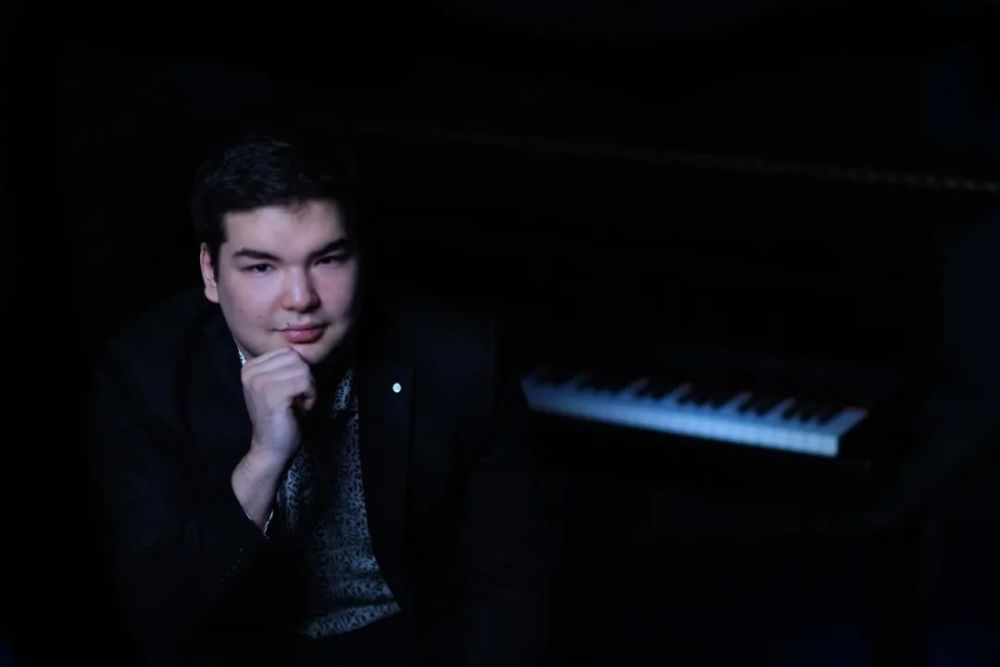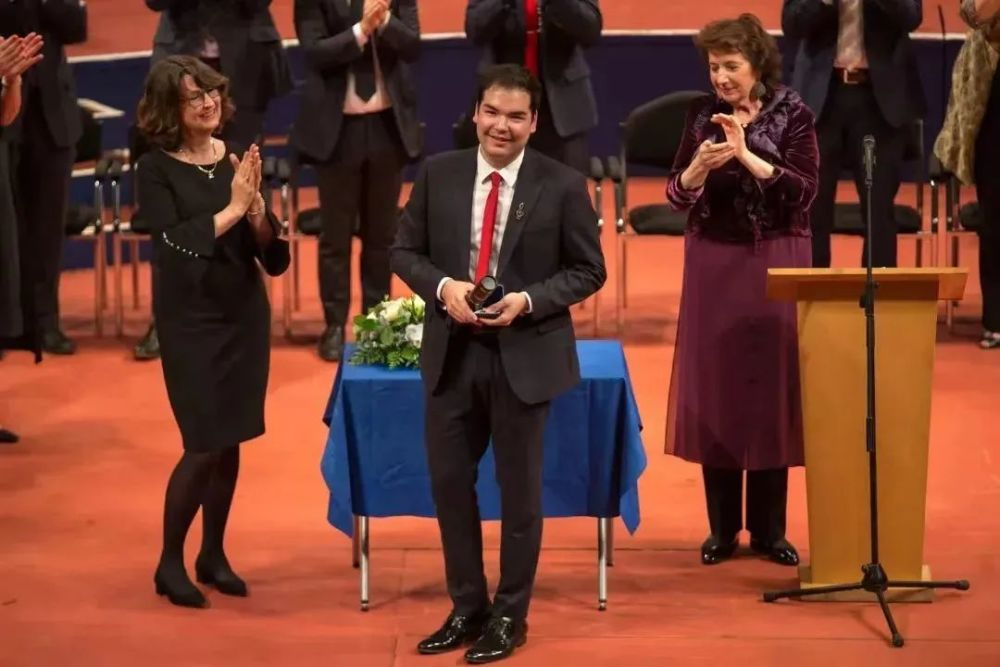来源:https://new.qq.com/omn/20220208/20220208A01MGV00.html

“来自哈萨克斯坦的阿利姆·贝森巴耶夫(Alim Beisembayev)演奏了强劲的贝多芬、热情的普罗科菲耶夫(Prokofiev)和闪闪发光的拉赫玛尼诺夫(Rachmaninoff)。他令人印象深刻,显然值得一看。”
——斯图尔特·伊萨科夫,《华尔街日报》
“这位钢琴家在舒曼令人敬畏的交响练习曲作品中表现出非凡的柔情和热情。”
—— 阿兰·福肖特,摩纳哥马汀
阿利姆·贝森巴耶夫(Alim Beisembayev)在2021年9月的利兹国际钢琴比赛中获得了冠军。在决赛中与利物浦皇家爱乐乐团,和安德鲁·曼泽合作演奏了拉赫曼尼诺夫的《帕格尼尼主题狂想曲》。他还获得了medici.tv的观众奖和利物浦皇家爱乐协会的现代音乐奖,英国《卫报》称赞他是 "当之无愧的冠军",具有"真正的音乐个性"。
他在2021/22乐季的演出亮点包括了与皇家利物浦爱乐乐团(由凯斯·斯卡格里奥尼指挥)、BBC交响乐团(克莱门斯·舒尔特指挥)、皇家音乐学院交响乐团(安东尼奥·帕帕诺爵士指挥)、SWR斯图加特交响乐团(林沂蓁指挥)和圣彼得堡国家音乐学院合唱团(郑皓安指挥)的首演。
阿里姆近期和即将举行的独奏会包括了在伦敦威格莫尔音乐厅、南岸艺术中心、牛津钢琴节、巴斯莫扎特音乐节、布里斯托尔圣乔治音乐厅和华沙肖邦学院的演出。
此外他还将与施坦威获奖者音乐会网络合作,在欧洲巡演,并与世界文化网络合作,在韩国进行巡演。他与华纳古典乐厂牌合作的首张专辑于2021年9月发行——一张以斯卡拉蒂、利盖蒂和拉威尔音乐为主题的录音专辑。
阿利姆1998年出生于哈萨克斯坦。他曾经与俄罗斯国立音乐学院“叶夫根尼·斯维特拉诺夫”交响乐团、莫斯科国家交响乐团和沃思堡交响乐团合作,并在伦敦皇家节日音乐厅和威格摩尔大厅进行过演出。
在普赛尔钢琴学校学习期间,他获得了多个奖项,包括范·克莱本国际少年钢琴比赛的一等奖。阿利姆师从Tessa Nicholson教授,并在皇家音乐学院跟随她继续学习。他目前正在皇家音乐学院跟随Vanessa Latarche教授,完成他的硕士学位。
他也赢得了许多音乐奖金,如英国皇家音乐学院联合委员会奖金、明斯特伯爵夫人奖金、服部基金会奖、德雷克·卡勒哈基金信托奖金,并属于人才无限(Talent Unlimited)慈善计划。
专访2021年利兹国际钢琴比赛冠军
——阿利姆·贝森巴耶夫
(中国独家)

Q1:在全球疫情的大背景中,你前往利兹并参加本届利兹国际钢琴比赛的经历如何?你有什么感受?
A1:参加利兹国际钢琴比赛是一次难忘的经历,特别是因为它是在全球疫情中举办的。我们非常幸运,活动从头到尾都有观众在台下观看,为他们演出是一件很愉快的事情。我其实只是从伦敦赶到了利兹,所以这对我来说不是什么大问题。
Q2: 我们知道,在你的职业生涯中,你有来到中国,能否请你分享一些与中国的故事?
A2:我只去过中国一次,但那是一次让我非常享受的旅行经历。在中国国际音乐比赛中,我们受到了很好的照顾,我也在那里进入了半决赛。尽管我因为没有进入决赛感到很失望,但北京烤鸭真的很好吃。这也算是一种补偿吧!我希望有机会能够再次到访中国。
Q3: 利兹钢琴比赛的第二轮到决赛,前后不过两周时间,你是如何应对多轮比赛的压力,又是如何选择每一轮的比赛曲目的呢?
A3:我们必须为每一轮比赛提交两首不同的曲目,评委会将从中选择一个。这的确是一项艰巨的任务,尤其是在半决赛和决赛中——因为我们在比赛几天前才能知道要演奏哪一首曲目。
因此,对我来说,在提交曲目的时候把新旧曲目结合起来,并使曲目发挥表现作用是非常重要的。贝多芬的最后一首奏鸣曲是我的梦想作品,它是钢琴文学的巅峰之作,在观众面前演奏它,是非常令人难忘的经历!
虽然比赛是颇有压力的,但重要的是需要记住,在比赛中你有机会和所有同行的伟大钢琴家交朋友。这其实跟抽奖很像,运气是非常重要的。因此,如果你收到了令人失望的结果,你只能继续前进,继续为成为一名艺术家而努力奋斗。
Q4:许多乐评人认为你的比赛曲目广泛地囊括了热门与冷门,古典和现代的作品。作为钢琴家,你是如何积累了如此丰富的演出曲库的呢?
A4:我们被要求准备特定当代作曲家的音乐,其中包括了利盖蒂·捷尔吉(Gy rgy Ligeti)。我一直对利盖蒂的练习曲很着迷。虽然它们学起来很费劲,但我选择了一套三首的练习曲,其中包括L'escalier du diable,这是最难的一首。尽管如此,这些练习曲似乎效果很好。评委们授予了我现代音乐奖,这是我没有想到的。
我一直致力于演奏多种作品,因为我仍然在"测试我的领土"。也许有一天我会意识到,我只想演奏巴赫,或者只想演奏拉赫玛尼诺夫!但现在,多才多艺,掌握大量曲库对于一个年轻艺术家是非常重要的。
Q5:在决赛中,你选择了拉赫玛尼诺夫的《帕格尼尼主题狂想曲》,你为什么选择了它?你认为演奏这首曲目的关键在哪里?
A5:我为决赛准备了两首协奏曲,包括拉赫玛尼诺夫的《帕格尼尼主题狂想曲》和贝多芬《第四钢琴协奏曲》。评审团在决赛几天前选择了拉赫玛尼诺夫的作品。
这是一部非常具有创造性的作品,充满了个性。与交响乐队一起演奏它并不容易,因此演出经验很重要。幸运的是,我在几年前就演奏过它。(我认为关键点是)极其华丽的第18个变奏,这也是大多数观众一直期待的时刻。
Q6:你最喜欢的钢琴曲目是什么?你为什么喜欢它?你会推荐哪一位钢琴家的演奏?
A6:在这么多的钢琴杰作中,我无法挑出一首最喜欢的钢琴曲。目前我正在演奏肖邦的《24首前奏曲》,这是我迷恋已久的一套曲目。
丹尼尔·特里福诺夫(Daniil Trifonov)的唱片是我最喜欢的唱片之一,它能放飞人们的思绪。还有一张由阿尔弗雷德·科尔托(Alfred Cortot)演奏的传奇录音。阿尔卡季·沃洛多斯(Arcadi Volodos)演奏的舒伯特的晚期A大调奏鸣曲也是一张充满真诚和深度的,伟大的录音专辑。
Q7:和我们分享一下你那些从中吸取音乐思想和创造力的兴趣,解释一下你是如何做到的?
A7:我的老师Tessa Nicholson和Vanessa Latarche肯定照顾了我。从某种意义上说,我的音乐一直在她们的引导下不断精进。Tessa Nicholson从我十几岁起就发挥着重要作用,没有她,我就不会有现在的成就。
此外,我还会大量地听音乐和音乐会,参观博物馆也能给我很多的启发,与朋友分享自己的体验也很棒。我感到非常幸运,能生活在像伦敦这样的文化中心,有这么多的机会可以做我自己的喜欢的事情。
撰稿人:阮琳婷
英文采访原版:
Q1:During such a pandemic, how was your experience of traveling to and attending LIPC at Leeds? What was your thought?
A1:Leeds was an unforgettable experience especially since it was in the middle of the pandemic. We were so lucky the whole event took place with a real audience whom it was a pleasure to play for. I only travelled up to Leeds from London, so it wasn’t a big problem for me.
Q2:We know that you have visited China for the China International Music Competition. Would you please share some stories when you visited China?
A2:I have only been to China once, a trip which I enjoyed enormously where we were very well looked after at the China International Music Competition where I reached the semifinals. Despite the disappointment of not reaching the finals, Peking duck was sublime which was a compensation. I would love to visit again.
Q3:Given a roughly 2-week competition schedule at Leeds, how did you deal with the pressure of these intense fixtures? And how did you select your repertoire for each performance?
A3:We had to submit two different programmes for each round from which the jury would choose one. It was indeed a tough task, especially for the semi-finals and finals as we would only find out which programme to play a few days before! Therefore, it was very important for me to combine carefully old and new repertoire and make the programmes work. Beethoven’s last sonata was a dream of mine to play which is one of the pinnacles of piano literature and performing it in front of that audience was very memorable!
Although competitions are stressful, it’s important to keep in mind that you have the opportunity to make friends with all the great pianists that are there with you and that it is also a lottery, as luck is very important. Therefore when receiving disappointing results, one should only move on and continue striving for more towards becoming an artist.
Q4:Some music critics praised you for your capability of playing an extensive repertoire covering the popular & uncommon, and the classical & modern. How do you build your repertoire to such an extensive & various stock?
A4:We were required to prepare music by specific contemporary composers, which included Ligeti. I was always fascinated by Ligeti’s etudes and although they are a struggle to learn, I chose a set of three one of which included ‘L’escalier du diable’ which is one of the most difficult ones. Nevertheless, the etudes seem to have worked very well since they awarded me the contemporary music prize which I was not expecting.
I always aim to play a wide variety as I’m still ‘testing my territories’. Perhaps one day I’ll realise that I want to play nothing but Bach, or nothing but Rachmaninov! But for now, versatility is very important for a young pianist.
Q5:Why did you choose Rachmaninoff's Rhapsody on a Theme of Paganini for your concerto final? In your opinion, what is the key to playing this piece of work?
A5:We prepared two concertos for the finals. I brought with me Rachmaninov Paganini and Beethoven 4th. The jury chose the Rachmaninov a couple of days before.
It’s a very inventive work which is full of character. It is not easy to play with an orchestra therefore knowing having experience is important. I was lucky I had played it a few years before. The 18th variation is gorgeous and is a moment most people in the audience always wait for.
Q6:What is your favorite piano piece and why? Whose performance would you recommend for this piece?
A6:I cannot single out one piano piece out of so many masterpieces. Currently I’m playing Chopin’s 24 Preludes which is a cycle I’ve been obsessed with for a long time. Daniil Trifonov’s one of my favourite recordings which takes people on a flight of emotions. There is also a legendary recording of Alfred Cortot playing them. Schubert’s late A major Sonata played by Volodos is a sublime recording which is full of honesty and depth.
Q7:Share with us those of your interests from which you draw musical ideas and creativity and explain how?
A7:My teachers Tessa Nicholson and Vanessa Latarche certainly take care of me in a sense that my music keeps going from strength to strength. Tessa Nicholson has played a major role since my teenage years without whom I wouldn’t be where I am. Otherwise, lots of listening and going to concerts, visiting museums has always been inspirational and sharing that experience with friends. I feel very lucky to live in such a cultural centre like London which has so much to offer in that sense.
Edited by Linting R